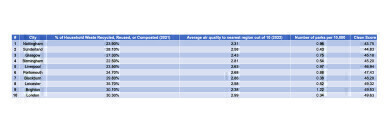Waste Management
Unveiling the UK's Least Green Cities: Nottingham Takes the Lead
Jul 20 2023
Recent research has brought to light the environmental standings of various UK cities, with Nottingham emerging at the top of the list. The comprehensive study, conducted by the national skip hire company ReliableSkip.com, meticulously analysed several factors for each city, including the percentage of recycled, reused, or composted waste, air quality, and the availability of nature and park attractions. Each city underwent scoring and ranking out of 100, based on these crucial environmental factors.
Shockingly, Nottingham secured the dubious honour of being the UK's least green city, with a meagre 'green score' of 43.75. The city lagged behind in waste management, with just 23.9% of household waste being recycled. Additionally, Nottingham faced challenges in air quality, with an average score of 2.31 based on 2022 data. Furthermore, the city had a relatively limited number of nature and park attractions, approximately 0.96 per 10,000 people.
Claiming the second spot in this unenviable ranking is Sunderland in Tyne and Wear, scoring 44.83 out of 100 on the green score scale. While they demonstrated a slightly better performance in waste management, with 28.1% of household waste being recycled, their air quality score of 2.58 still leaves much room for improvement. Furthermore, the availability of nature and park attractions was rather scarce, with approximately 0.43 per 10,000 people.
Glasgow secured the third position on the list, with a green score of 45.18 out of 100. The Scottish city struggles with waste management, recycling only 27.3% of household waste, and earned a moderate air quality score of 2.43. On a positive note, Glasgow boasts a more considerable number of nature and park attractions compared to the previous cities, with approximately 0.75 per 10,000 people.
Birmingham, the largest city in the top ten, managed to clinch the fourth spot but with a mere green score of 45.2. It faced the lowest recycling rate among all cities, with only 22.5% of household waste being recycled. Birmingham's air quality scored 2.81, indicating room for improvement in this area as well. Nature and park attractions in the city stood at approximately 0.54 per 10,000 people.
Completing the top five least green cities is Liverpool, which achieved a green score of 46.94. The city's air quality score of 2.63 remained a concern, along with a recycling rate of 23.5% for household waste. Liverpool fared slightly better than its counterparts in terms of the availability of nature and park attractions, with approximately 0.97 per 10,000 people.
Commenting on the findings, Paul Bennett, Operations Director at ReliableSkip.com, emphasised the importance of collective efforts in maintaining environmental sustainability. He highlighted that while individuals can play their part through actions like recycling, it is equally vital for governments and local authorities to enforce and encourage eco-friendly practices to create a greener future for all. The disparities among cities regarding waste management underscore the need for greater commitment to environmental initiatives nationwide.
Events
IWA World Water Congress & Exhibition
Aug 11 2024 Toronto, Canada
Aug 25 2024 Stockholm, Sweden and online
Sep 03 2024 Mexico City, Mexico
Sep 03 2024 Mexico City, Mexico
Sep 03 2024 San Diego, CA, USA













